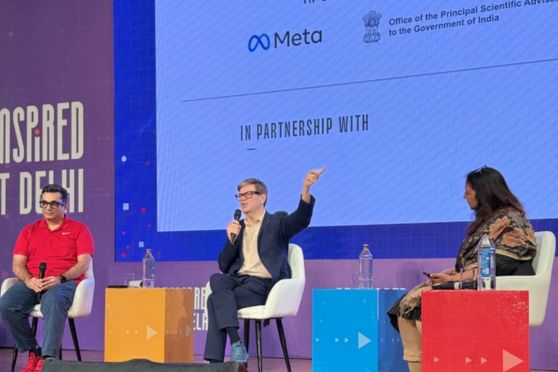AI to Empower, Not Threaten: Meta's Chief AI Scientist Yann LeCun at IIT Delhi


Dr Yann LeCun, Meta's Chief AI Scientist and a pioneer in Artificial Intelligence, participated in a panel discussion at IIT Delhi on October 24, 2024, laying out his vision for the future of AI and its intersection with human capabilities. During the panel discussion titled ‘From Neural Mimics to Smart Assistants - A Journey into AI's Next Frontiers', Dr Yann emphasized the need for a rethink of AI architectures, the advantages of open-source, and India's unique potential in the AI landscape.
The session ‘Be Inspired at IIT Delhi with Yann LeCun’ was opened by Dr Preeti Banzal, Scientist G & Advisor to the Principal Scientific Advisor, Government of India, who emphasised the Indian government's initiatives towards responsible AI.
While welcoming Dr Yann, IIT Delhi Director Prof Rangan Banerjee spoke about the Institute's initiatives in human-AI interface research and the Centre for Healthcare—a collaboration between the Government of India, AIIMS, and IIT Delhi aimed at advancing healthcare through AI.
Challenging the current approaches to AI development, Dr Yann urged for innovative architectures beyond large language models (LLMs). He argued that current AI paradigms are insufficient to achieve true human-like intelligence.
He further said, "We are not going to reach that stage by using the current paradigm and just making it bigger; we need essentially new architectures like objective-driven architecture.” Instead of scaling up models, he argued for systems that understand the physical world and reason through novel situations.
Dr Yann also focused on spatial AI and projects like JEPA. He described AI's evolution as a sigmoid curve— rapid expansion followed by saturation. Singularity, where machines surpass human intelligence, is not on the immediate horizon. Instead, the future lies in evolving paradigms and replacing outdated approaches with new models that can build a "world model," capable of perceiving, predicting, and planning like animals.
Addressing concerns about AI safety, he dismissed fears of intelligent systems dominating humans. He stated that AI's purpose is to empower. "The future of AI in my opinion is a future in which everyone will be walking around with an assistant digitally like smart glasses." he said, humorously adding, "It'll be like walking around with three smart people working for you." Dr. Yann also highlighted that advanced AI models are already used to ensure ethical outcomes, emphasizing the need for better AI to safeguard against misuse.
On India's role in the AI era, Dr Yann emphasized the diversity of cultures, languages, and value systems as a key strength. "The training of the big models is to be distributed. India has an important part to play in this because of the size of the population, the diversity of cultures, and value systems," he said. He envisioned smart glasses helping rural farmers interact with AI in their local dialects, with real-time subtitles. He also spoke about future models using LLaMA 3, which could support India's 22 official languages and translate non-written languages—all made possible through open-source technology.
Dr Yann concluded by emphasizing that the future of AI depends on collaboration and innovation. With new architectures, open-source contributions, and India's diverse talent, AI can become a powerful tool for societal growth, empowering individuals and solving real-world challenges.